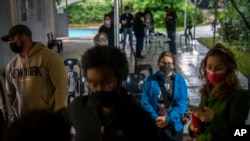South African businesses are worried about the implications of the new coronavirus variant called omicron that was discovered in the country this week. Travel bans already are mounting and many fear lockdown restrictions will return.
Mimosas were guzzled Saturday at the trendy Altar Bar in Johannesburg.
But despite the steady stream of brunch-goers, the staffers were on edge.
The discovery of the new coronavirus variant called omicron has sparked fears that another lockdown is looming.
Bar manager Josh Young says it would be devastating for the business that only opened in September.
"I have warned my staff members that there could be a lockdown coming in and how we're going react to it, how we're going to operate after that. It is worrying because you're basically taking money out of people's pockets because this is what they do to survive," Young said.
Scientists are still scrambling to determine what risks omicron poses.
Dr. Michelle Groome with South Africa’s National Institute for Communicable Diseases says getting vaccinated is still vital to preventing severe illness or death.
She says ongoing precautions like wearing masks and social distancing and limiting indoor gatherings also will help reduce the virus’s spread.
Groome says if hospitals get overburdened, South Africa will have to consider more restrictions.
"I know no one is in favor of the alcohol bans, but I think it really has shown to decrease the number of trauma-related hospitalizations, and if we get to the point where there, you know, is a need for additional hospital capacity, you know, something like that may need to be considered," Groome said.
That is worrisome news for restaurants, bars and stores that are still struggling to recover from lockdowns in June and July.
Mike Kotsiovos co-owns a liquor store in Johannesburg.
"I’m panicking a bit," Kotsiovos said. "Turnover is down quite a bit and it's only a slight improvement over this last period that we've been trading normally, which is about a month. So, we [are] suffering basically.”
It’s also affected his personal life.
The 71-year-old said he hasn’t seen his daughter who lives in Britain in two years.
Britain was the first country to halt flights to and from South Africa when omicron was discovered.
The United States and European Union have followed suit.
Kotsiovos says seeing his daughter over the holidays is now unlikely.
"I think this time she's not going to come. She was planning to come," Kotsiovos said. "I think they booked a flight and everything, but I don’t think they'll come. It’s her and her husband.”
The South African government says travel bans are unfairly punishing the country for having the expertise to identify new variants.
It says variants are found elsewhere in the world, but those countries aren’t punished with travel restrictions in the same manner as southern Africa.
South Africa’s foreign ministry says it's working to persuade countries that have imposed bans to resume flights.







